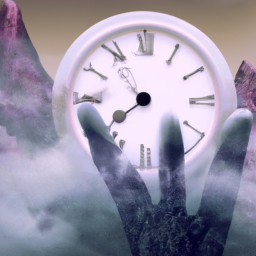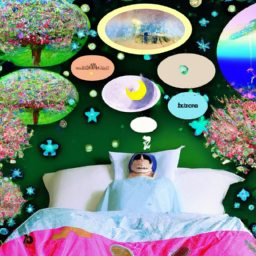Have you ever woken up from a dream feeling like you’ve experienced a whole lifetime in just a few minutes? Or have you had a dream that felt like it only lasted a few seconds?
Dreams are fascinating and mysterious experiences that have captured the attention of scientists and psychologists for decades. I can help you understand more about them.
One question that often comes up about dreams is how long they typically last. In this article, we’ll explore what we know about the duration of dreams, what factors can influence their length, and how dreams can impact our waking lives.
Key Takeaways
- The duration of dreams varies from person to person and can last from a few seconds to 20-30 minutes.
- Good sleep quality tends to result in longer and more vivid dreams, while sleep deprivation can result in shorter and less memorable dreams.
- Dreams play a significant role in memory consolidation, problem-solving, and creativity, allowing the brain to make connections between seemingly unrelated ideas.
- Dream recall can be improved by keeping a dream journal, getting enough sleep, practicing visualization, and reflecting on dreams upon waking up.
Understanding the REM Stage of Sleep
Did you know that during the REM stage of sleep, your dreams can last anywhere from a few minutes to over an hour? REM stands for ‘Rapid Eye Movement’ and it’s the stage of sleep where most dreaming occurs. It’s called ‘REM’ because your eyes move rapidly back and forth behind your eyelids.
During REM sleep, your brain waves are similar to those of someone who’s awake, but your muscles are paralyzed to prevent you from acting out your dreams. The length of your dream during this stage can vary depending on how long you stay in REM sleep.
Most people experience several cycles of REM sleep throughout the night, with each cycle lasting longer as the night goes on. With that said, let’s dive into the average duration of dreams.
The Average Duration of Dreams
On average, dreams seem to fly by in the blink of an eye. However, the actual duration of a dream varies from person to person and can range anywhere from a few seconds to as long as 20-30 minutes.
Despite this wide range, most dreams tend to last between 5-20 minutes, with the majority falling somewhere in the middle.
It’s important to note that the length of a dream is not necessarily related to the length of the REM stage of sleep. While REM sleep is commonly associated with dreaming, it’s possible to have dreams during other stages of sleep as well.
Factors such as sleep quality, stress levels, and medication use can all influence the duration and intensity of our dreams.
Factors that Influence Dream Duration
Factors like sleep quality, stress levels, and medication use can affect how long our dreams stick with us. When we have a good night’s sleep, we tend to have longer and more vivid dreams. On the other hand, when we are sleep deprived, our dreams may be shorter and less memorable. Stress can also impact the duration of our dreams, with higher levels of stress leading to shorter dreams. Additionally, certain medications can affect the length and quality of our dreams, such as antidepressants which are known to suppress REM sleep, the stage of sleep where we typically have the most vivid dreams.
To better understand how these factors can impact our dreams, consider the following table:
| Factor | Effect on Dream Duration | Emotion Evoked |
|---|---|---|
| Sleep Quality | Longer and more vivid dreams | Happiness |
| Stress Levels | Shorter dreams | Anxiety |
| Medication Use | Can affect the length and quality of dreams | Confusion |
It’s interesting to note how these factors can impact our dreams and ultimately our waking lives. Understanding the factors that influence dream duration can be helpful in promoting healthier sleep habits and managing stress levels, which in turn can lead to more positive dream experiences.
The Impact of Dreams on Our Waking Lives
I’ve always been interested in how my dreams impact my waking life.
From what I’ve read, it seems that dreams play a significant role in memory consolidation, problem-solving, and creativity. They also help us process and regulate our emotions.
I’m excited to explore these topics further and see how my dreams might be influencing my daily life in ways I never even realized.
Memory Consolidation
Dreams are like a mental movie, with the brain using this time to consolidate memories and emotions. During sleep, the brain works to sort through the day’s events and organize them into long-term memory. This process helps us to retain important information and forget the trivial details.
Additionally, dreams can provide a space for emotional processing, allowing us to work through difficult experiences and emotions in a safe and private environment. As we sleep, our brains are busy at work, consolidating memories and emotions. This process is essential for our overall well-being, as it helps us to retain important information and manage our emotions.
In the next section, we will explore how dreams can also contribute to problem-solving and creativity.
Problem Solving and Creativity
When we’re trying to solve a problem or come up with a creative solution, our brain can benefit from the imaginative and unconventional thinking that occurs during sleep. Dreams can offer unique insights and perspectives that we might not consider while awake.
In fact, studies have shown that sleep can improve problem-solving abilities and creativity. During REM sleep, the brain is highly active and can make connections between seemingly unrelated ideas. This can lead to ‘aha’ moments and breakthroughs in problem-solving.
Additionally, dreams can help us think outside the box and approach problems from a different angle. However, it’s important to note that not all dreams are beneficial for problem-solving and creativity. Some dreams may be too chaotic or nonsensical to offer any useful insights.
As we move into the subsequent section about emotional processing, it’s important to remember that dreams can serve multiple functions during sleep. They not only aid in problem-solving and creativity, but also play a role in emotional regulation and memory consolidation.
Emotional Processing
You may have experienced how your emotions can feel amplified or even exaggerated during sleep, as if you’re carrying the weight of the world on your shoulders. This is because dreaming is a way for our brains to process emotional experiences.
During REM (rapid eye movement) sleep, which is when most dreaming occurs, our brains are actively working to sort through memories and emotions. This is why we may wake up feeling sad after a dream where we experienced loss or feeling happy after dreaming about a loved one.
It’s important to pay attention to our dreams and the emotions they bring up, as they can offer insight into our subconscious thoughts and feelings. By becoming more aware of our emotional processing during sleep, we can better understand ourselves and our emotions in waking life.
This leads us to the next section on tips for enhancing dream recall.
Tips for Enhancing Dream Recall
Improving dream recall can be a fascinating and rewarding experience, especially if you’re interested in exploring the depths of your subconscious mind. Here are a few tips that’ve worked for me personally:
-
Keep a dream journal by your bed. This way, as soon as you wake up, you can write down as many details as you can remember about your dream. Even if you only remember a few fragments, write them down. Over time, you may start to notice patterns or recurring themes in your dreams.
-
Get enough sleep. It’s harder to remember your dreams if you’re sleep-deprived. Aim for 7-9 hours of sleep each night.
-
Practice visualization before bed. Imagine yourself in a peaceful, relaxing place. This can help you fall asleep faster and may improve your dream recall.
-
Wake up slowly. Instead of immediately jumping out of bed, try to lie still for a few moments and focus on your dreams. Sometimes, just a few extra seconds of reflection can help you remember more details about your dream.
Frequently Asked Questions
Can dreams be longer or shorter than the average duration?
Dreams can vary in length, sometimes feeling like they last for hours when in reality they only last a few minutes. So yes, dreams can be both longer and shorter than the average duration.
Do people in different age groups experience different dream durations?
As I age, I’ve noticed my dreams tend to be shorter and less vivid. However, I’m not sure if this is true for everyone. It’s possible that age can affect dream duration, but more research is needed to confirm.
Is there a correlation between dream duration and dream content?
Isn’t it funny how the more vivid and exciting my dreams are, the shorter they seem to be? I’ve noticed that my dreams filled with action and adventure always feel like they fly by, while the mundane ones drag on forever.
Can external factors, such as noise or light, affect the duration of dreams?
External factors, like noise or light, can disrupt my sleep and cause me to wake up during a dream, making it feel shorter. However, I’m not sure if they can directly affect the actual duration of the dream itself.
Are there any medical conditions that can affect dream duration?
Oh, just a few medical conditions that can totally mess with dream duration. You know, things like sleep apnea, depression, and even certain medications. Not that I would want my dreams to last any longer…
Conclusion
So, how long do dreams typically last? The answer is not as straightforward as we might think.
While the average dream duration is believed to be between 20-30 minutes, there are a multitude of factors that can influence this, including the stage of sleep we’re in, our age, and even our level of stress.
One theory that has gained traction in recent years is that dreams can serve as a form of emotional regulation and problem-solving. This theory suggests that our dreams may help us process and make sense of our daily experiences, as well as work through any unresolved emotional issues we may be facing.
While more research is needed to fully understand this theory, it certainly adds an interesting layer to the already fascinating world of dreams.









